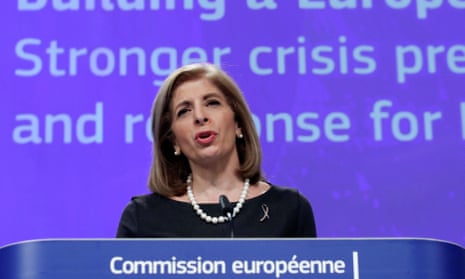Brussels is seeking a major shift in powers towards the EU’s health agencies, warning that Europe’s faltering approach to the coronavirus pandemic has caused “confusion and distrust”.
The EU commissioner for health, Stella Kyriakides, said the bloc’s lack of readiness for the crisis had meant substandard care for patients and left medics without access to vital resources.
At the height of the first wave of the pandemic, the Italian government hit out at the lack of solidarity within the EU after its urgent calls for medical resources from fellow European governments were ignored.
Kyriakides, a former MP in Cyprus who is also a psychologist with a degree from Reading University, said she believed the pandemic had been a “wake-up call” to EU capitals.
She said: “We have seen in the beginning of this crisis how fragmentation can make member states more vulnerable. We saw that in the beginning, in the first few weeks, the effects of uncoordinated national measures. There was a lack of readiness and preparation.
“And we saw that with the shortfall of medical equipment, testing capacity and coordination in many areas. So this uncoordinated approach, what it directly means is that citizens don’t get the best healthcare.
“It means they don’t have the access that they should have to the medicines they need, to the medical devices and the medical equipment they may need.”
Under a new regulation on serious cross-border threats to health proposed by the European commission on Wednesday, EU member states would be obliged to report on the capacities of their healthcare systems, while national crisis plans would be scrutinised by the bloc’s officials for weaknesses.
The EU would establish a strengthened surveillance system using artificial intelligence to watch out for any outbreaks of disease or weaknesses in healthcare capacity within its territory.
An entirely new organisation modelled on the US biomedical research and development authority will also be formed by 2023 to build up stockpiles of key medicines and equipment. The Health Emergency Response Authority (Hera) will be tasked with developing a “surge capacity” in production for times when raw materials from outside of Europe might be scarce.
In the past, the bloc’s member states have resisted greater EU powers in the area of health. Most recently leaders cut heavily into the commission’s spending proposals on medical research and resilience for the next seven-year EU budget.
Kyriakides said she was confident that there had been a realisation of the need for more EU involvement in coordination of the member states’ responses to health emergencies.
“We fully respect member states’ competences for health system but Covid-19 is a wake-up for everyone,” the commissioner said.
“Viruses know no borders, and other health threats know no borders. Citizens expect the EU to take a more active role in the area of health, to take a more active role in protecting them. They have been asking Europe to be more present in the area of public health. From the beginning of this crisis I have said this many times: this is a necessity. We need more EU in the area of public health.”
As part of its “health union” package, the commission is proposing a major revamp for the Swedish-based European Centre for Disease Prevention and Control (ECDC) to allow it to collect and analyse the level of preparedness for a crisis in the member states.
During the pandemic, the ECDC was only able to offer technical guidance but it will in future make recommendations for the EU as a whole to adopt.
The agency will also be responsible for auditing national crisis response plans. It will deploy a pool of experts to member states when help is needed. The European medicine agency will be empowered to track potential shortages of medicines and medical devices.









